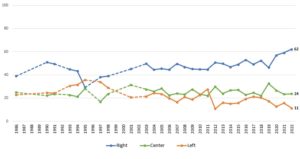Right Wing Rises in Israel Amid Widening Rift Between Arabs and Jews
A growing number of Jewish Israelis identify as right wing, Israel Democracy Institute survey shows
A growing number of Jewish Israelis now identify as right-wing, according to a survey of self-reported political affiliation that was published by the Israel Democracy Institute (IDI) on Tuesday.
While 46% of Jewish voters declared themselves to be right-wing in April 2019, that number has spiked to 62% on the eve of Israel’s November 1 national election. The survey is based on responses from 3,855 interviews and was led by IDI researcher Dr. Or Anabi.

Percentage of Jewish voters according to political camps, according to IDI surveys over the years. (Courtesy)
The survey asked Israelis to place themselves on the political spectrum from 1 to 7, ranging from far left to far right. Answers ranging from 1 to 3 represent left-wing positions, 4 is classified as centrist, and 5 to 7 are right-wing.
When the same survey was first conducted in 1986, 39% of Jewish Israelis self-identified as right-wing, 25% as centrist, and 23% as left-wing. After Prime Minister Yitzhak Rabin was assassinated in 1995, the same survey found that 36% viewed themselves as left-wing, 29% as right-wing, and 28% as being in the center of the political spectrum.
The tension between Jews and Arabs is garnering more attention and taking on a more central role in Israeli politics
Anabi believes that the recent rightward shift stems from a widening rift between Jews and Arabs in the country.
“The tension between Jews and Arabs is garnering more attention and taking on a more central role in Israeli politics,” Anabi told The Media Line. “In the past, the same issue would take central stage during and immediately after military operations, but now we’re seeing that it has been staying with us even a year after the unrest.”
Anabi was referring to last year’s conflict between Israel and Hamas in Gaza, which was coupled with civil unrest between Jews and Arabs in Israel’s mixed cities. During that period, street violence broke out between Jews and Arabs across Israel – with Arab mobs assaulting Jews and Jewish rioters assaulting Arabs.
This holiday season, give to:
Truth and understanding
The Media Line's intrepid correspondents are in Israel, Gaza, Lebanon, Syria and Pakistan providing first-person reporting.
They all said they cover it.
We see it.
We report with just one agenda: the truth.


Some 74% of Israelis are Jewish and 22% are part of the country’s Arab minority, according to 2020 figures by Israel’s Central Bureau of Statistics.
“We cannot ignore that the incidents that took place in these mixed cities led many Jews to want to break away from or separate from the Arab minority,” Anabi said. “These events led to Jews wanting to distance themselves from Arabs, more so than the other way around.”
The widening rift between the two communities is also apparent in the rise of far-right extremist Itamar Ben-Gvir, who leads the Otzma Yehudit (Jewish Power) party and is slated to win a significant number of seats in the upcoming election, he added.
Likud party leader and former Prime Minister Binyamin Netanyahu continues to lead in the polls; however, these polls also continue to show that the ongoing political deadlock which has plagued Israel for the past several years will not be resolved by the upcoming vote.
In a poll published by the Maariv newspaper last week, neither Israeli Prime Minister Yair Lapid nor opposition leader Netanyahu’s blocs would be able to muster the majority needed to form a government in the 120-seat Knesset. According to the poll, if elections were held in Israel today the Netanyahu-led Likud bloc would hold 58 seats, while the Lapid-led Yesh Atid bloc would hold 56 seats. The remaining six seats would be held by the Arab-majority Joint List, which has repeatedly refused to join any government.
According to Anabi, the deadlock is due to Israeli voters remaining steadfast in their voting habits.
“The political camps that people identify with are based on something that goes much deeper and is related to issues of identity,” he explained. “If I am Ashkenazi (of Eastern European extraction) there is a much greater chance that I’ll identify with the left than if I’m a Mizrahi (from the Middle East). If I’m secular then there’s a greater chance that I’ll support the center or left than if I identify as traditional or religious.”
“As soon as political camps are dependent on such deep identity markers then there is very little chance of getting a person to change their political camp,” he added.
As soon as political camps are dependent on such deep identity markers then there is very little chance of getting a person to change their political camp
Amir Oren, an Israeli political and defense analyst, said that the rise of the right is due primarily to a lack of progress in the peace process with the Palestinians coupled with changing demographics.
“People define themselves mostly along the Arab-Jewish axis rather than the economic or social dimensions of right versus left,” Oren told The Media Line. “Many of those who consider themselves right-wing actually hold socialist views regarding their own welfare. If you look at the poor ultra-Orthodox communities, they want the government to support them.”
Anabi agrees that an important demographic trend also explains the rise of the right wing in Israel, namely that fertility rates among the ultra-Orthodox and religious in Israel are significantly higher than among the secular.
He predicted that in the coming years, right-wing parties would find it much easier to form a government without having to rely on support from the center or left.
“What are the odds that we’ll see another government coalition like the one that exists now? In my view, quite low,” Anabi said. “There’s also a much greater chance that the next prime minister, and also those within the coming decade, will be from the Likud.”

